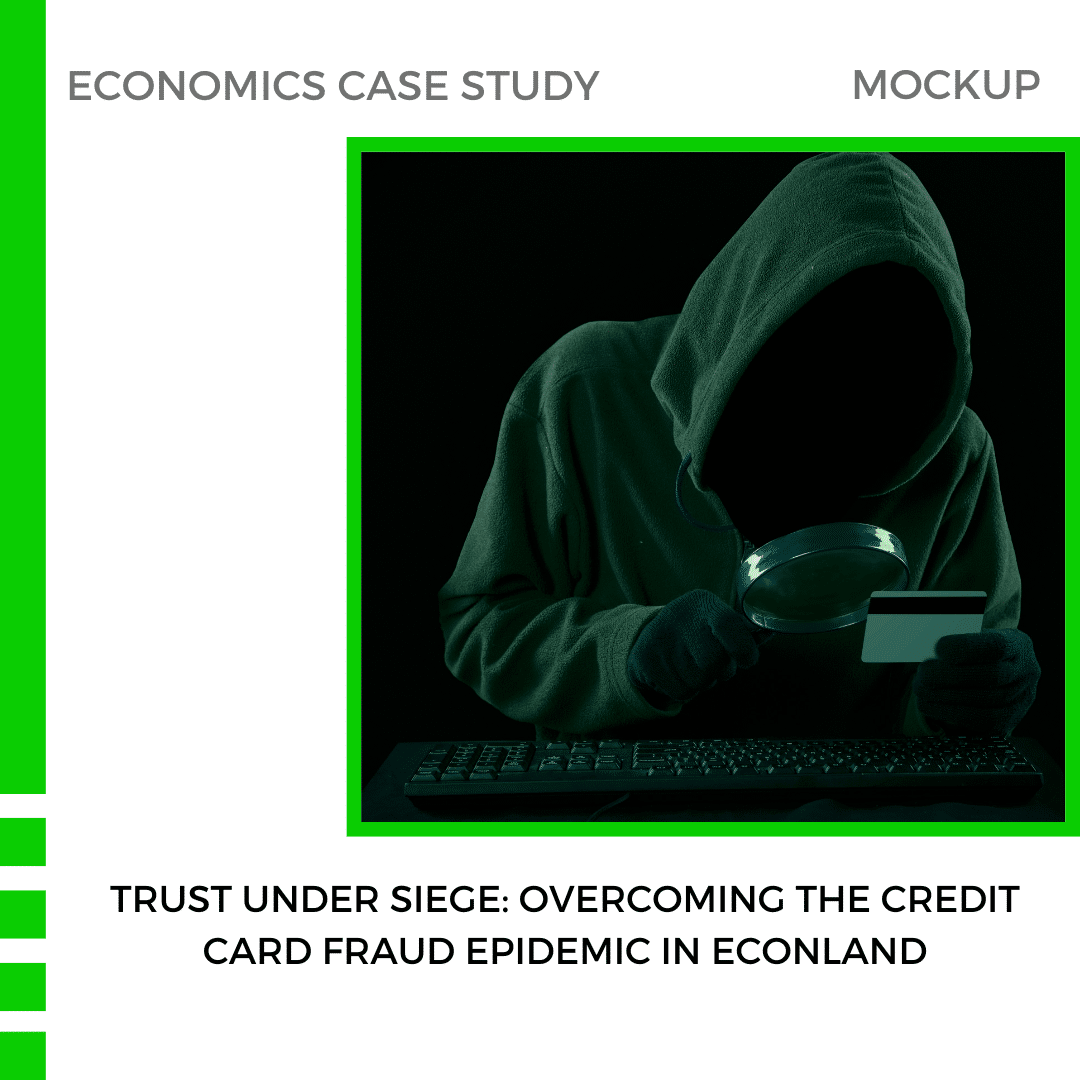
Trust Under Siege: Overcoming the Credit Card Fraud Epidemic in Econland
Introduction
In this case study, we explore the profound impact of rampant credit card fraud on the economy of a fictional nation known as Econland. The rise in credit card fraud has destabilized various economic sectors and triggered a significant downturn in the country’s GDP. The alarming situation presents an in-depth analysis of the crisis, identifying the contributing factors, immediate consequences, and potential strategies for mitigation and recovery. As students engage with this case, they are tasked with analyzing the key issues, understanding the broader economic context, and proposing innovative solutions to tackle the economic challenges of credit card fraud.
Like many modern economies, Econland has embraced digital payment systems, making it a prime target for fraud. This case study critically examines the challenges posed by credit card fraud, highlighting the urgent need for comprehensive strategies to combat this growing threat and restore stability and trust in the financial system.
Background of Econland
Overview of Econland
Econland is a developed nation characterized by a robust financial sector heavily reliant on credit cards for consumer transactions. The economy is diverse, with significant contributions from the financial services, retail, and technology sectors. The convenience and efficiency of credit card usage have become integral to consumer spending habits.
Growth of Credit Card Usage
Over the past decade, there has been a rapid increase in credit card usage in Econland, driven by technological advancements and a consumer shift toward cashless transactions. This growth has been supported by a robust banking infrastructure and a regulatory environment encouraging financial innovation. However, the factors facilitating this growth have also made the economy vulnerable to fraud.
Key Events Leading to the Credit Card Fraud Crisis
Increase in Cybercrime
In recent years, Econland has seen a dramatic rise in cybercrime, particularly credit card fraud. Organized crime syndicates have increasingly targeted the financial sector, exploiting vulnerabilities in digital payment systems to carry out large-scale fraudulent activities.
Data Breaches
High-profile data breaches at major financial institutions and retail companies have compromised millions of consumers’ personal and financial information. These breaches have provided fraudsters with the data necessary to execute fraudulent transactions, exacerbating the credit card fraud crisis in Econland.
Regulatory Gaps
Despite its advanced financial sector, Econland’s regulatory framework has struggled to keep pace with cybercriminals’ evolving tactics. Insufficient regulations and inadequate enforcement have increased credit card fraud, putting consumers and businesses at risk.
Immediate Impact on Econland
Financial Losses
The financial sector has been hit hardest by the credit card fraud crisis. Banks and financial institutions have incurred substantial losses due to fraudulent transactions, increased security expenses, and compensation to affected customers. These financial losses threaten the overall health of the economy.
Consumer Confidence
The pervasive nature of credit card fraud has severely eroded consumer confidence in digital payment systems. Many consumers have returned to cash transactions or limited their spending, resulting in a marked decline in consumer activity.
Economic Contraction
The drop in consumer spending has led to a cascading effect on the economy. Retail sales have plummeted, businesses are experiencing reduced revenues, and the country’s GDP growth has slowed significantly. The economic contraction has raised concerns about the long-term viability of many businesses.
Impact on Financial Institutions
Banks and other financial institutions have faced increased operational costs due to the need for enhanced security measures, fraud detection systems, and customer support services. The additional costs have strained the financial sector’s profitability, making recovering from the credit card fraud crisis even more challenging.
Strategic Challenges
Enhancing Cybersecurity
To combat credit card fraud effectively, Econland must bolster its cybersecurity infrastructure. This includes investing in advanced fraud detection technologies, improving data encryption, and enhancing the security protocols of financial institutions to safeguard consumer information.
Regulatory Reform
Strengthening the regulatory framework is essential in the fight against credit card fraud. This involves updating existing regulations, implementing stricter enforcement measures, and ensuring financial institutions adhere to best data protection and fraud prevention practices.
Restoring Consumer Confidence
Rebuilding consumer trust in the financial system is crucial for economic recovery. Financial institutions must communicate transparently, offer compensation to affected customers, and run public awareness campaigns that educate consumers on avoiding credit card fraud.
Supporting Affected Businesses
Businesses suffering from declining consumer spending need robust support to ensure their survival. Financial assistance, tax relief, and incentives for adopting secure payment systems can help businesses navigate the challenges of credit card fraud.
Possible Solution: Comprehensive National Fraud Prevention Program
A comprehensive National Fraud Prevention Program is proposed to address the pressing challenges posed by credit card fraud in Econland. This program would focus on the following key components:
- Investment in Cybersecurity Infrastructure: The government should allocate funds to improve the cybersecurity infrastructure of financial institutions. This includes adopting advanced technologies such as artificial intelligence and machine learning for real-time fraud detection.
- Regulatory Overhaul: Implement a thorough review and update of existing regulations concerning credit card transactions. Stricter compliance requirements should be enforced to ensure financial institutions prioritize consumer data protection.
- Consumer Education Campaigns: Launch nationwide campaigns to educate consumers about the risks of credit card fraud. These campaigns should provide practical tips for protecting personal information and recognizing fraudulent activities.
- Collaboration with Law Enforcement: Foster collaboration between financial institutions and law enforcement agencies to enhance the investigation and prosecution of credit card fraud cases. A task force can be established to tackle organized crime syndicates involved in fraud.
- Financial Support for Affected Individuals: Create programs to support individuals and businesses that have suffered due to credit card fraud, ensuring they receive the necessary financial aid to recover and regain confidence in the financial system.
By implementing this National Fraud Prevention Program, Econland can effectively combat credit card fraud, restore consumer trust, and stabilize its economy.
Conclusion
The case of credit card fraud in Econland presents a complex challenge with far-reaching implications for the financial sector, consumer confidence, and overall economic stability. Students are encouraged to analyze this situation from multiple perspectives, develop strategic solutions, and consider the broader economic implications. This case study highlights the urgent need for effective measures against credit card fraud and emphasizes the importance of proactive strategies to ensure a resilient and secure financial environment. Through this examination, students can apply their theoretical knowledge to real-world scenarios, fostering critical thinking and problem-solving skills essential in today’s interconnected financial landscape.
References
- Federal Trade Commission (FTC)
- Consumer Financial Protection Bureau (CFPB)
- National Cyber Security Centre (NCSC)



